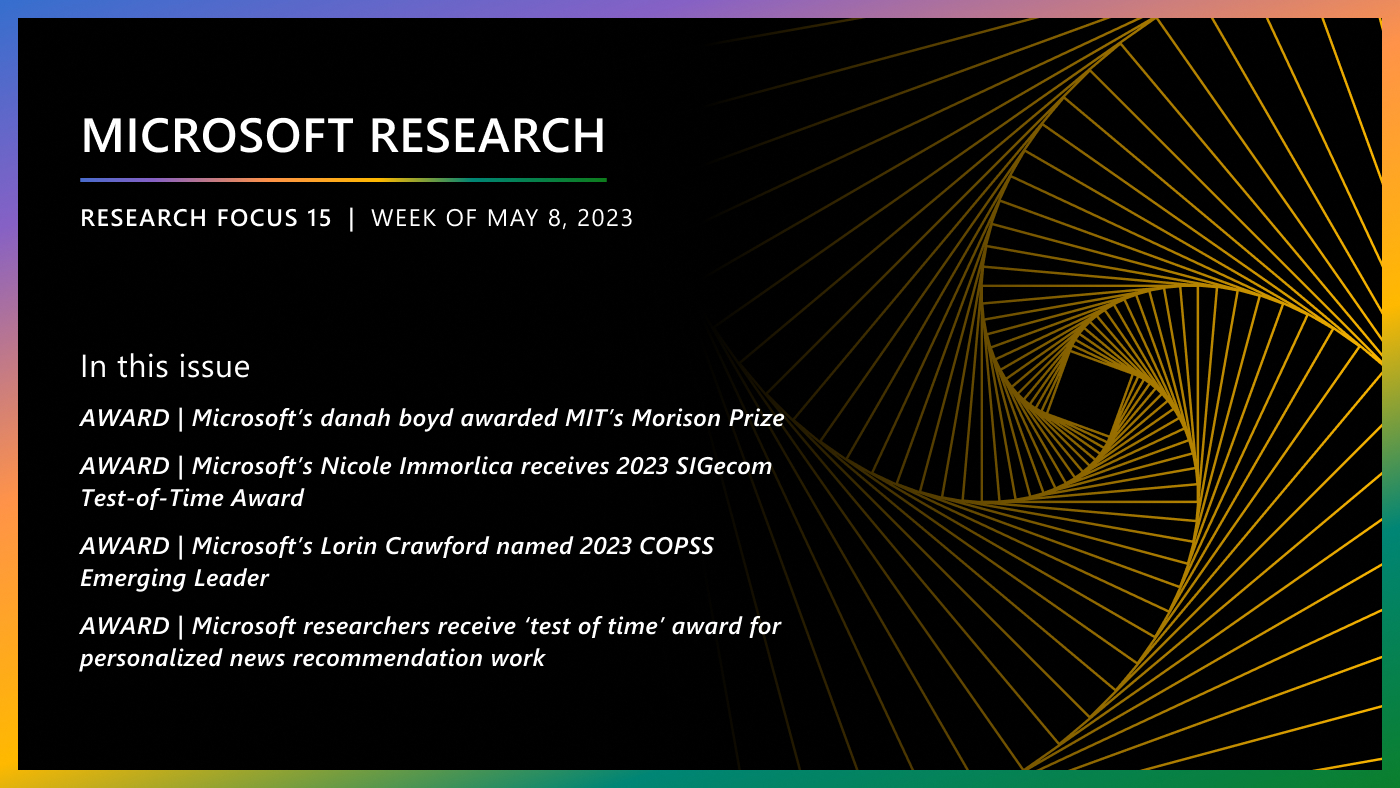Posted by Jennifer Chayes, managing director of Microsoft Research New York City
 (opens in new tab)
(opens in new tab)
The inaugural year of Microsoft Research New York City (opens in new tab) has been stupendous. All of us at Microsoft are thrilled with our newest lab.
The lab officially opened on May 3, 2012, with the announcement of a group of 15 founding researchers: David Pennock (opens in new tab), Sébastien Lahaie (opens in new tab), Justin Rao (opens in new tab), David Rothschild (opens in new tab), and Giro Cavallo (opens in new tab) in algorithmic, computational, and empirical economics; Duncan Watts (opens in new tab), Dan Goldstein (opens in new tab), Sharad Goel (opens in new tab), Sid Suri (opens in new tab), and Jake Hofman (opens in new tab) in computational and behavioral social science; John Langford (opens in new tab), Miro Dudik (opens in new tab), and Alekh Agarwal (opens in new tab) in machine learning; and Fernando Diaz (opens in new tab) and Elad Yom-Tov (opens in new tab) in information retrieval. Together, these researchers bring a deeply original and phenomenally productive approach to data science, particularly in the domains of economics and the social sciences.
In the fall, the group was joined by one more member, Jenn Wortman Vaughan (opens in new tab), who has done research in machine learning, algorithmic economics, and social science, and who, therefore, was a great match for the lab.
Microsoft Research Blog
Microsoft Research Forum Episode 3: Globally inclusive and equitable AI, new use cases for AI, and more
In the latest episode of Microsoft Research Forum, researchers explored the importance of globally inclusive and equitable AI, shared updates on AutoGen and MatterGen, presented novel use cases for AI, including industrial applications and the potential of multimodal models to improve assistive technologies.
 (opens in new tab)Our New York City researchers immediately dived in and engaged deeply with product groups, other Microsoft Research labs, and the local community. Rothschild spearheaded an effort with the Xbox LIVE (opens in new tab) team to put together a tremendously successful interactive channel for the U.S. election. Polls conducted on the channel during events such as the presidential and vice-presidential debates and election night received millions of responses—producing phenomenal data for academic studies and substantially increasing user engagement. On election night, Rothschild’s prediction engine, done in collaboration with Pennock and Dudik, correctly predicted all state outcomes except Florida. Other deep product-group engagements include Lahaie’s engagement with Microsoft’s Online Services Division, Langford’s engagement with the company’s Server and Tools Business, and many more.
(opens in new tab)Our New York City researchers immediately dived in and engaged deeply with product groups, other Microsoft Research labs, and the local community. Rothschild spearheaded an effort with the Xbox LIVE (opens in new tab) team to put together a tremendously successful interactive channel for the U.S. election. Polls conducted on the channel during events such as the presidential and vice-presidential debates and election night received millions of responses—producing phenomenal data for academic studies and substantially increasing user engagement. On election night, Rothschild’s prediction engine, done in collaboration with Pennock and Dudik, correctly predicted all state outcomes except Florida. Other deep product-group engagements include Lahaie’s engagement with Microsoft’s Online Services Division, Langford’s engagement with the company’s Server and Tools Business, and many more.
Our researchers ran conferences to bring together both the academic and internal communities. Goel and Hofman organized the Computational and Online Social Science Workshop at Columbia. Langford was co-chair of the program committee of ICML, one of the major worldwide conferences in machine learning. He also organized an internal Microsoft machine-learning class attended by hundreds of people from Microsoft product groups.
The lab also has received many honors. Vaughan won the Presidential Early Career Award for Scientists and Engineers (opens in new tab) from President Obama. Goldstein was named a Fellow at both the Center for Measurable Marketing (opens in new tab) at NYU’s Stern School of Business and the Applied Statistics Center at Columbia University’s Institute for Social and Economic Research and Policy. Goldstein and Suri, along with Preston McAfee of Google, won the Best Paper Award during the 13th ACM Conference on Electronic Commerce.
Given their amazing start, I can’t wait to see what the New Year brings for our Microsoft Research New York City researchers!





